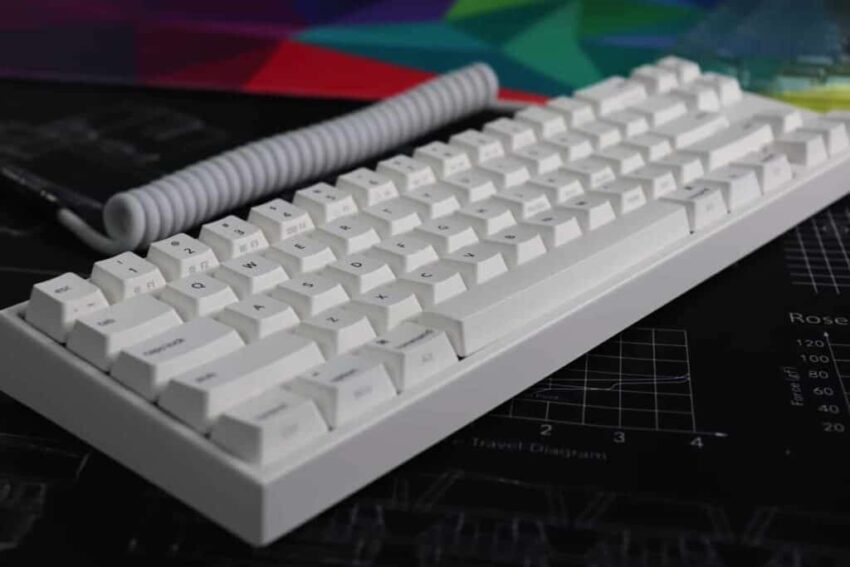Skip to content

Mechanical keyboard are the go-to choice for gamers and typists who require precision, speed, and comfort. However, like any electronic device, they are susceptible to damage, especially when exposed to water. Spilling liquids on your keyboard can cause irreversible damage, rendering it unusable and forcing you to buy a replacement. In this article, we will explore the effects of water damage on mechanical keyboards and provide tips to prevent it from happening.
What Happens When You Spill Water on Your Mechanical Keyboard?
When you spill water on your keyboard, it can seep through the keys and damage the internal components, such as the printed circuit board (PCB), switches, diodes, and connectors. Water is a good conductor of electricity, so it can short-circuit the connections and cause the keyboard to malfunction or stop working altogether. Water can also cause corrosion, rust, and oxidation, which can degrade the quality of the keyboard and reduce its lifespan.
Some of the common symptoms of water damage in mechanical keyboards include:
-
Keys that do not respond or register when pressed
-
Keys that register multiple times or register as a different key
-
Sticky or mushy keys that do not return to their original position
-
Lights or indicators that do not light up or stay on continuously
-
Unusual noises or sounds when typing
-
Burnt smell or smoke coming from the keyboard
If you notice any of these signs, it is likely that your keyboard has suffered water damage and needs immediate attention. Continuing to use a water-damaged keyboard can cause further damage and pose a safety hazard.
Preventing Water Damage to Your Mechanical Keyboard
Prevention is the best cure when it comes to water damage. Here are some tips to protect your mechanical keyboard from accidental spills and splashes:
-
Keep liquids away from your keyboard: The simplest and most effective way to avoid water damage is to keep drinks, food, and other liquids away from your keyboard. Use a separate table or tray for your drinks and make sure they are not placed near your keyboard. If you must drink near your keyboard, use a spill-proof cup or bottle.
-
Cover your keyboard: If you work in a messy or dusty environment, consider using a keyboard cover to protect your keyboard from spills, dust, and debris. Keyboard covers are inexpensive and easy to install, and they can be removed and washed when dirty.
-
Clean your keyboard regularly: Cleaning your keyboard regularly can help remove dirt, dust, and grime that can accumulate and damage your keyboard. Use a soft cloth or brush to gently clean the keys and the surface of your keyboard. Avoid using water or cleaning solutions unless necessary, and make sure your keyboard is completely dry before using it again.
Mechanical keyboards are known for their durability and long lifespan, but like any electronic device, they are not invincible. One of the most common causes of damage to mechanical keyboards is water exposure. Whether you accidentally spill your drink on your keyboard or get caught in a rainstorm with your laptop, water can cause serious damage to your keyboard if not handled properly. In this guide, we’ll discuss how water can damage your mechanical keyboard and provide tips for avoiding keyboard catastrophes.
How Water Can Damage Your Mechanical Keyboard
Water is a conductor of electricity, which means that it can cause a short circuit in your keyboard if it comes into contact with the electronic components. This can result in the keyboard malfunctioning, keys not working properly, or even permanent damage to the keyboard. Water can also corrode the metal components in your keyboard, causing rust and other types of damage.
Tips for Avoiding Keyboard Catastrophes
-
Keep Drinks Away from Your Keyboard
One of the most common causes of water damage to mechanical keyboards is spilled drinks. To avoid this, keep all drinks and liquids away from your keyboard. If you must have a drink at your desk, use a spill-proof container to minimize the risk of spills.
A keyboard cover can help protect your keyboard from spills and other types of damage. These covers are made of silicone or other materials that are waterproof and can be easily cleaned if they get dirty. Keyboard covers are also relatively inexpensive and can be purchased online or at most computer stores.
-
Dry Your Keyboard Immediately
If your keyboard does get wet, it’s important to dry it immediately to minimize the risk of damage. Turn off your keyboard and unplug it from your computer, then use a towel or cloth to absorb as much water as possible. You can also use a hairdryer on a low setting to dry the keyboard, but be sure to hold it at least a few inches away from the keyboard to avoid overheating or melting any plastic components.
-
Let Your Keyboard Air Dry
After you’ve removed as much water as possible, let your keyboard air dry for at least 24 hours before using it again. Don’t try to use a damp keyboard, as this can cause further damage to the electronic components. If you’re in a hurry, you can use a fan to help speed up the drying process, but don’t use a heat source like an oven or microwave.
-
Consider Getting a Waterproof Keyboard
If you’re particularly accident-prone or work in an environment where spills are common, you may want to consider investing in a waterproof keyboard. These keyboards are designed to be completely waterproof and can withstand exposure to liquids without suffering any damage. While they may be more expensive than standard mechanical keyboards, they can save you a lot of money in the long run by preventing costly repairs or replacements.
